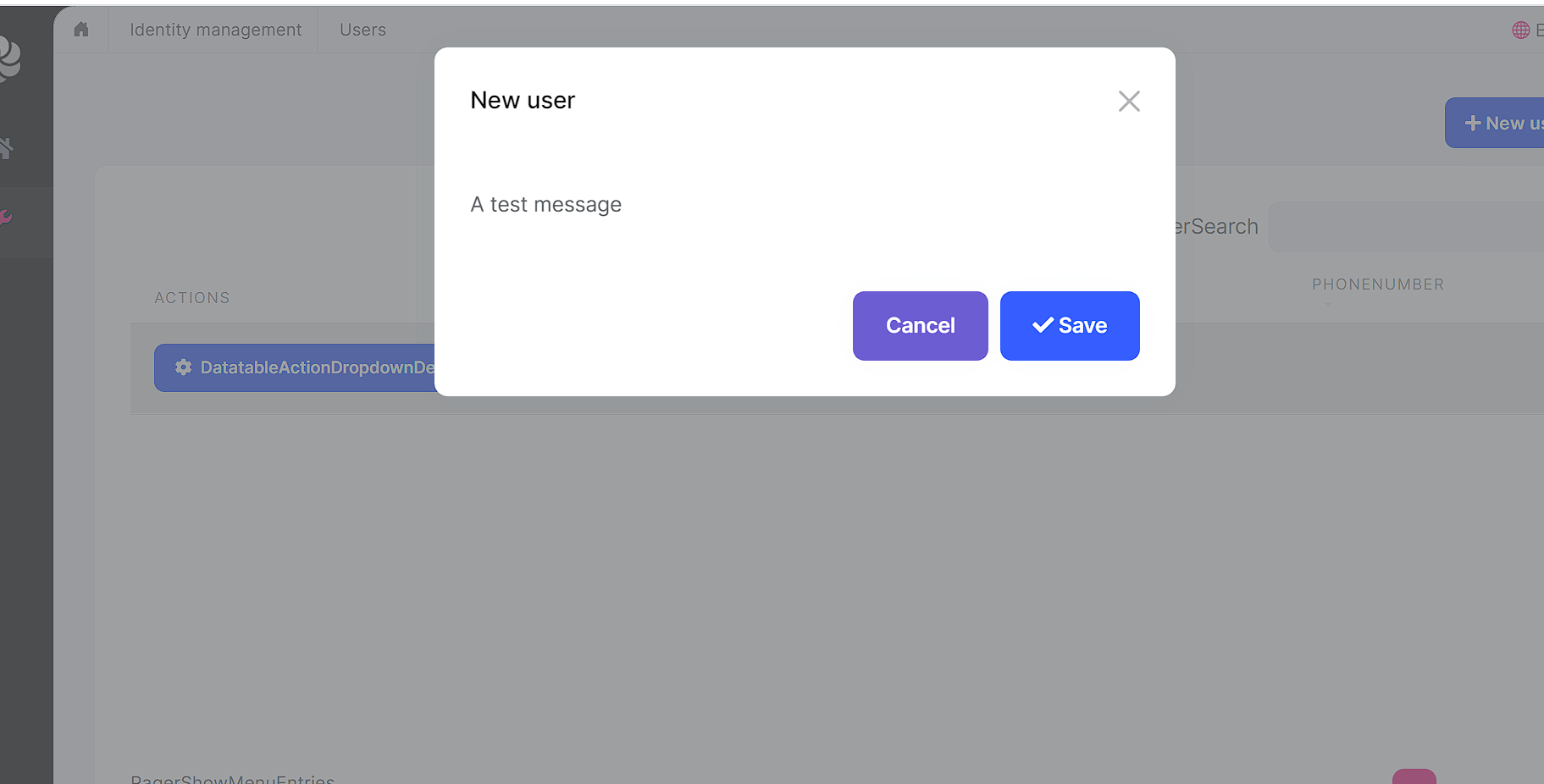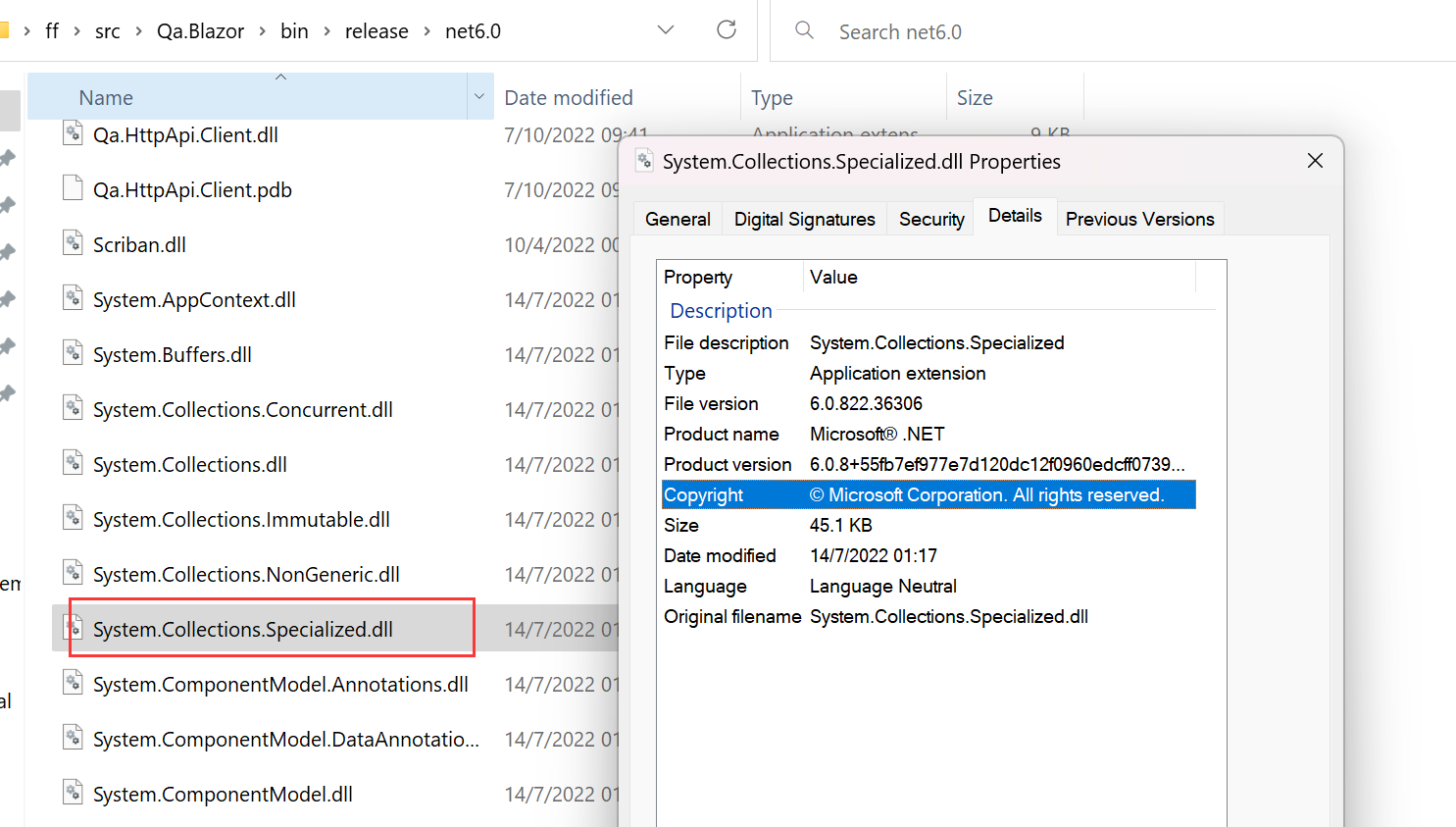Activities of "liangshiwei"
Hi,
You can try this:
- Add
Volo.Abp.Identity.Pro.Domainto yourDomainproject - Add
Volo.Abp.Identity.Pro.EntityFrameworkCoreto yourEntityFrameworkCoreproject - Add module dependencies to your module
Domain
public class AgencyUser : FullAuditedAggregateRoot<Guid>
{
public Guid IdentityUserId { get; set; }
public IdentityUser IdentityUser { get; set; }
public Guid AgencyId { get; set; }
public Agency Agency { get; set; }
}
public class Agency : Entity<Guid>
{
public string Name { get; set; }
}
EntityFrameworkCore
public class AgencyUserMap : IEntityTypeConfiguration<AgencyUser>
{
public void Configure(EntityTypeBuilder<AgencyUser> builder)
{
builder.ConfigureByConvention();
builder.ToTable("AgencyUser");
builder.HasKey(x => x.Id);
builder.Property(x => x.Id).ValueGeneratedOnAdd();
builder.HasOne<IdentityUser>().WithMany().HasForeignKey(x => x.IdentityUserId);
builder.HasOne<Agency>().WithMany().HasForeignKey(x => x.AgencyId);
builder.Navigation(x => x.IdentityUser).AutoInclude();
builder.Navigation(x => x.Agency).AutoInclude();
builder.ApplyObjectExtensionMappings();
}
}
builder.ApplyConfiguration(new AgencyUserMap());
builder.Entity<Agency>(b =>
{
b.ToTable("Agency");
b.ApplyObjectExtensionMappings();
});
[ReplaceDbContext(typeof(IIdentityProDbContext))]
[ConnectionStringName(MyServiceDbProperties.ConnectionStringName)]
public class MyServiceDbContext : AbpDbContext<MyServiceDbContext> , IIdentityProDbContext
{
// Identity
public DbSet<IdentityUser> Users { get; set; }
public DbSet<IdentityRole> Roles { get; set; }
public DbSet<IdentityClaimType> ClaimTypes { get; set; }
public DbSet<OrganizationUnit> OrganizationUnits { get; set; }
public DbSet<IdentitySecurityLog> SecurityLogs { get; set; }
public DbSet<IdentityLinkUser> LinkUsers { get; set; }
public DbSet<AgencyUser> AgencyUsers { get; set; }
public DbSet<Agency> Agencies { get; set; }
public MyServiceDbContext(DbContextOptions<MyServiceDbContext> options)
: base(options)
{
}
protected override void OnModelCreating(ModelBuilder builder)
{
base.OnModelCreating(builder);
builder.ConfigureIdentityPro();
builder.ConfigureMyService();
}
}
Hi,
Add reference to package: Volo.Abp.IdentityServer.Domain to EntityFrameworkCore and Domain projects
I remember that ABP app pro startup template already preinstalled those modules, are you using a module template?
Hi,
You can check if the NET Core Runtime is installed on your server. https://learn.microsoft.com/en-us/dotnet/core/install/linux
Hi,
We will check it.
Hi,
Try removing Response.StatusCode = 403;
This is my code:
public ModelError Error { get; set; }
public class ModelError
{
public string Message { get; set; }
}
public virtual async Task<IActionResult> OnGetAsync()
{
try
{
throw new UserFriendlyException("A test message");
UserInfo = new UserInfoViewModel();
var roleDtoList = (await IdentityUserAppService.GetAssignableRolesAsync()).Items;
Roles = ObjectMapper.Map<IReadOnlyList<IdentityRoleDto>, AssignedRoleViewModel[]>(roleDtoList);
foreach (var role in Roles)
{
role.IsAssigned = role.IsDefault;
}
}
catch (Exception e)
{
Error = new ModelError { Message = e.Message };
}
return Page();
}
<form method="post" asp-page="/Identity/Users/CreateModal">
<abp-modal>
<abp-modal-header title="@L["NewUser"].Value"></abp-modal-header>
<abp-modal-body>
@if (Model.Error != null)
{
<span>@Model.Error.Message</span>
}
else
{
.....
}
.......
Hi,
Can you share the full steps? thanks.
Hi,
Here is a sample you can check https://github.com/abpframework/abp/tree/dev/modules/blogging/app/Volo.BloggingTestApp.MongoDB
Hi,
You can add a custom message handler
public override void PreConfigureServices(ServiceConfigurationContext context)
{
PreConfigure<AbpHttpClientBuilderOptions>(options =>
{
options.ProxyClientBuildActions.Add((s, builder) =>
{
builder.AddHttpMessageHandler<MyMessageHandler>();
});
});
}
public class MyMessageHandler : DelegatingHandler, ITransientDependency
{
protected override Task<HttpResponseMessage> SendAsync(HttpRequestMessage request, CancellationToken cancellationToken)
{
request.Headers.Add(....);
return base.SendAsync(request, cancellationToken);
}
}
menus folder with the menucontributor and i followed your instructions, only permission work but it didn't appear any button or link in the menu. So if I want to apply permission on a button or link that already exists, what's the best way to do this? E.g. I want to apply a permission on the "My account" button (see the picture below)
Here I have explained how to hide link account, to hide my account we just have to do something like this: https://support.abp.io/QA/Questions/3741#answer-d4e39d0b-e9fe-2225-d96c-3a067a5828eb
public class MyProjectNameMenuContributor : IMenuContributor
{
public async Task ConfigureMenuAsync(MenuConfigurationContext context)
{
//......
if (context.Menu.Name == StandardMenus.User)
{
var linkedAccount = context.Menu.GetMenuItemOrNull("Account.Manage");
linkedAccount?.RequirePermissions("<Your permission name>");
}
}
}
It still does not work for you, you can share the project with me via email, I will check it, shiwei.liang@volosoft.com

